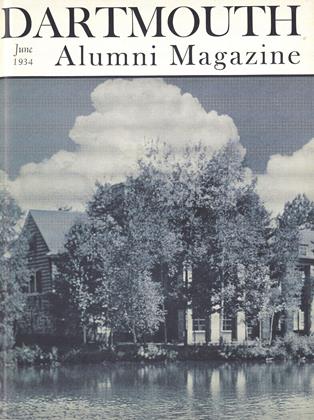During the week-end of the Dartmouth Secretaries' meeting, May 12, returning alumni had an opportunity to see the widely heralded new coach putting his Green charges through the last practice session of his initial spring conditioning season; and, from reports, enthusiasm that has been dampened by a three year's string of Dartmouth losses was re-awakened as well-oiled Green teams scrimmaged against each other on Chase field.
That Boston Post storm-center of Dartmouth athletics, Columnist Bill Cunningham, was up during the month to look over the work of the new football regime, and even he was well pleased with next year's prospects. In an article prepared for The Dartmouth he wrote in characteristic Cunningham style that Dartmouth football practice is "no longer a rump mob scene from the Five and Ten By General Hickory Jackson, it not only looked like something; it was something. There was system and sense and intelligence to it. Take that team, shave its shins and put some decent regimentals on it, and it would have been a better looking club than Dartmouth has had in the autumn for the last five years. It has more slash and drive and cohesion and conception of what it really was trying to do than any Green battle unit since Hawley lost his magic."
The local German Club (which, under the enthusiastic efforts of faculty advisor Stephen J. Schlossmacher, has greatly eclipsed in importance the other language clubs) sent several of its members to visit the German cruiser "Karlsruhe" anchored in the Hub City's port. An anti-Nazi voxpop appeared in the daily Dartmouth criticising the Club for its show of friendship to the Hitler regime "at a time when some people with much more to lose than the average college student are going out of their way to boycott Nazi Germany." This was answered with indignant replies by members of the "Germania," and a few days later the Club held a banquet-dance and flag decoration ceremony at the Hanover Inn, to which were invited German club members from several girls colleges and ten cadets from the "Karlsruhe." Curious undergraduates looking in on the banquet from the Inn lawn (hopeful of crashing the dance) were amused to see cadets and German Clubbers eating with their German Club hats on.
As their outstanding lecturer of the year the Junto brought Braintruster Rex Tugwell from his duties at Washington to speak to the undergraduate body in Bartmouth Hall. To 2000 disappointed listeners who expected to hear a specific explanation of the New Deal or a stinging attack on opponents of the Rooseveltian polices, Mr. Tugwell devoted his lecture to broad and abstract considerations of "a philosophic conception of life."
The Players put on two short productions "The Wandering Scholar" and "Tom Tyler and His Wyfe,"—and drew three consecutive full houses when word got around that the plays were full of sex and that several faculty members had advised that women not be admitted to see them. —MILBURN MCCARTY IV '35.
 View Full Issue
View Full Issue
More From This Issue
-
 Class Notes
Class NotesClass of 1923
June 1934 By John C. Allen, "Graham Whitelaw" -
 Article
ArticleHANOVER BROWSING
June 1934 By Rees H. Bowen -
 Class Notes
Class NotesClass of 1910
June 1934 By Harold P. Hinman -
 Sports
SportsBaseball
June 1934 By C. E. Widmayer '30 -
 Class Notes
Class NotesClass of 1908
June 1934 By L. W. Griswold -
 Class Notes
Class NotesClass of 1914
June 1934 By Edwrd Leech, Ed Leech
Article
-
 Article
ArticleDARTMOUTH PSYCHOLOGICAL TEST ADOPTED BY EDUCATION COUNCIL
May 1925 -
 Article
ArticleThayer School
April 1940 -
 Article
ArticleSample Creates New York Murals
October 1955 -
 Article
ArticleAssociated Schools
October 1973 By J.J. ERMENC -
 Article
ArticleThe Undergraduate Chair
April 1953 By Richard C. Cahn '53 -
 Article
ArticleThe Undergraduate
April 1956 By RICHARD L. GORDON '56

